Taxing Transportation
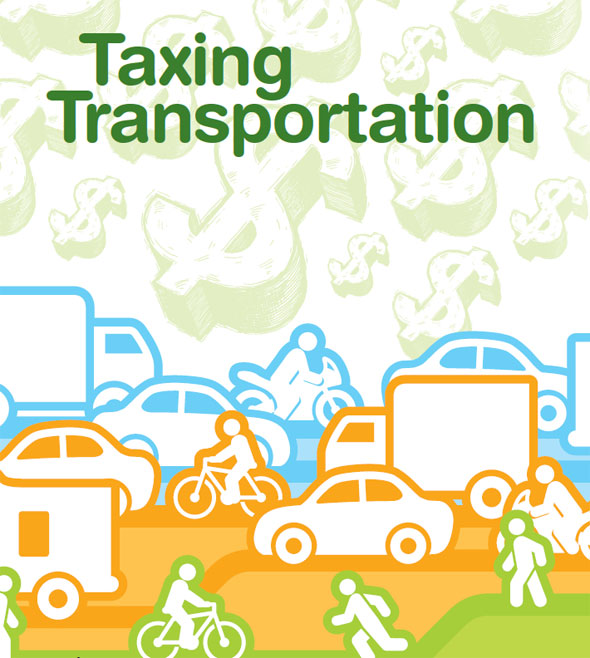
During the boom years of the late 20th century, the Atlanta region boasted some of the nation’s fastest growing counties. With high-paying jobs and a quality of life to match, satellite counties like Cobb, Gwinnett and DeKalb developed major universities, regional airports, world-class hospitals and entertainment arenas.
Lacking mountains or oceans to tame its unbridled growth, Atlanta became a metropolis on hyperdrive. To ease the congestion, the region widened highways and installed HOV lanes, but they were little match for the million new residents who have moved to Atlanta over the past decade. Drivers idled as their commutes ballooned to an hour each way, and Atlanta now lays claim to the ninth worst congestion in the country. With three million more residents expected over the next 30 years, the region’s already overburdened roadways will have to accommodate a population equivalent to that of the entire state of Mississippi. After many years of proposals and resolutions, local governments have come up with the Transportation Investment Act (TIA) in an effort to ease the burden, and on July 31, it will be put to the citizens of the metro region for a vote.
History of the Referendum
Kathryn Lawler, external affairs manager for the Atlanta Regional Commission, which supports the TIA, says that growth resulting from economic success created the first half of “the math problem.” The second half of “the math problem” is the fact that all federal and state transportation money comes from per-gallon federal and state gas taxes. The federal rate is currently 18.4 cents per gallon, and Georgians pay a flat 7.5-cent per gallon excise tax, a fluctuating 4 percent prepaid sales tax and a local tax rate of 2–4 percent, depending on the area. While Georgia has the 18th highest gas tax in the U.S., most of Atlanta’s transportation money is spent on current maintenance. As a result, the region ranks 48th in national transportation spending. This shortfall is exacerbated by the fact that the state has not raised the gas tax since 1971. In fact, this past June, Governor Nathan Deal halted a planned increase in the state gas tax, while the federal gas tax has remained stagnant since 1993.
The result of the population increase is seven of the worst freeway bottlenecks, including those linking I-285 to I-85, I-75 and I-20. Civic leaders, traffic engineers and regional planning agencies set about finding a solution to Atlanta’s traffic woes. The result was the TIA, passed by Georgia’s General Assembly in 2010. The law divided Atlanta into 12 regions, each represented at a roundtable led by the chairman of each county and a local mayor. The roundtables met for more than a year, whittling down a $22 billion wish list to fit the $8.5 billion Regional Transportation Referendum, a 10-year, one-percent sales tax designed to bridge the city’s transportation funding gap. “The referendum marks the largest public input project in the history of the city,” says Lawler, who notes that more than 200,000 people contributed ideas and opinions to the list.
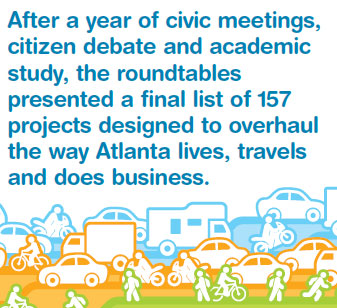 After a year of civic meetings, citizen debate and academic study, the roundtables presented a final list of 157 projects designed to overhaul the way Atlanta lives, travels and does business. “Our economy works best when goods and people can get to where they need to go efficiently,” says Lawler, “and investing in infrastructure means employers suddenly have a larger talent pool to choose from, and employees have a greater number of jobs to choose from.”
After a year of civic meetings, citizen debate and academic study, the roundtables presented a final list of 157 projects designed to overhaul the way Atlanta lives, travels and does business. “Our economy works best when goods and people can get to where they need to go efficiently,” says Lawler, “and investing in infrastructure means employers suddenly have a larger talent pool to choose from, and employees have a greater number of jobs to choose from.”
Referendum Pros
Supporters of the new bill believe that the Regional Transportation Referendum marks an ambitious turning point in the history of the city, one as critical as the decision to build Hartsfield-Jackson Atlanta International Airport. “This referendum will really set the trajectory of the region for the next 20 to 30 years,” says Demming Bass, COO of the Cobb County Chamber of Commerce. “This vote is being watched globally by businesses thinking about [relocating] to the region.”
To alleviate the city’s global traffic woes, developers of the referendum settled on an 85- to 15-percent solution. Of the 157 proposed projects, most of which have sat on county backlogs for years, 85 percent are regional projects that impact a large number of people, while 15 percent address localized, county problems.
Region wide, the projects slated for development include fixing bottlenecks that connect Atlanta’s major highways to I-285, funding a streetcar project in downtown and Midtown, funding the initial east and west corridors of the Beltline, a major MARTA rail extension through Decatur’s Clifton Corridor and bus rapid transit routes that could accommodate light rail in the distant future. The bill also includes road widening, traffic signal synching and bridge improvements across the region, providing a transportation call center for elderly and disabled people and augmenting sidewalks, bike lanes and arterial roads in some of Atlanta’s most populous and congested areas. “Half of the projects on the list help people get off the roads and half of the list is designed to make the roads better,” explains Lawler.
The Stakes for Cobb
Cobb County is no stranger to transportation taxes. In late 2011, voters approved a four-year extension on a one-cent sales tax. The SPLOST, which went into effect on Jan. 1, 2012, continues a tax that was approved six years ago. Proponents estimated that the tax would generate about $492 million, with more than $250 million going toward projects like installing sidewalks, repairing bridges and repaving roads all across the county.
Through the additional one-cent sales tax, Cobb County will receive just under a billion dollars in funding to improve nine intersections along Cobb Parkway, conduct interchange improvements to I-75 north at Windy Hill Road and install a new air traffic control tower and lighting system at McCollum Airport. Dozens of roads, including Roswell Road and South Cobb Drive, are also slated for alignments, widening, new overpasses and safety improvements. “Fifteen percent of the money will go to safe roads and intersection improvements in places like Mableton and Town Center, and a lot of the money will be spent to improve the roads near I-75 that back up the interstate,” says TIA supporter and Cobb County Chairman Tim Lee, during a June 6 wireside chat with nearly 3,000 Cobb citizens.
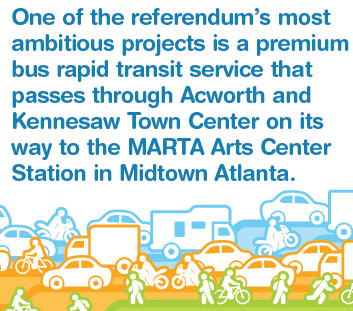 One of the referendum’s most ambitious projects is a premium bus rapid transit service that passes through Acworth and Kennesaw Town Center on its way to the MARTA Arts Center Station in Midtown Atlanta. “The project will include dual, reversible lanes independent of other traffic,” says Lee of the $700 million project. “The lanes will only carry commuter buses and bypass 75 entirely.” In the future, the bus line could be augmented with a light rail line for Cobb commuters traveling to Atlanta. “The Northwest Corridor transit project would provide great benefits for seniors and young residents of rapidly growing activity centers like Kennesaw, Marietta and Cumberland,” says Faye DiMassimo, director of the Cobb County Department of Transportation and a supporter of the referendum. “We’re currently working with several companies who are thinking about relocating to the region, but they’re sitting on the sidelines right now because of the congestion,” says Bass, who is keenly aware of the bill’s impact on economic development. In addition to maintaining a corporate edge, the region is expected to gain 34,000 construction jobs and 200,000 permanent jobs, most in the medium- to high-paying sectors, as a result of the planned projects.
One of the referendum’s most ambitious projects is a premium bus rapid transit service that passes through Acworth and Kennesaw Town Center on its way to the MARTA Arts Center Station in Midtown Atlanta. “The project will include dual, reversible lanes independent of other traffic,” says Lee of the $700 million project. “The lanes will only carry commuter buses and bypass 75 entirely.” In the future, the bus line could be augmented with a light rail line for Cobb commuters traveling to Atlanta. “The Northwest Corridor transit project would provide great benefits for seniors and young residents of rapidly growing activity centers like Kennesaw, Marietta and Cumberland,” says Faye DiMassimo, director of the Cobb County Department of Transportation and a supporter of the referendum. “We’re currently working with several companies who are thinking about relocating to the region, but they’re sitting on the sidelines right now because of the congestion,” says Bass, who is keenly aware of the bill’s impact on economic development. In addition to maintaining a corporate edge, the region is expected to gain 34,000 construction jobs and 200,000 permanent jobs, most in the medium- to high-paying sectors, as a result of the planned projects.
Taxation Vexation
Understandably, many taxpayers are wary of handing over their hard-earned income for yet another pet project or spending scandal. The TIA stipulates that each of the 12 regions implement an independent citizens review panel charged with regular review of the projects within their jurisdiction. “Each regional review panel has oversight over the allocation of funds in their county, and they are responsible for submitting an annual report to the General Assembly,” says Lee. “It’s a system we’ve used in Cobb County for decades to ensure projects arrive on time and on budget.”
Unlike the Georgia 400 toll project, the referendum is designed to prevent indefinite taxation. “The bill is very clear that the tax cannot be renewed without an act approved by the majority of legislators within the region, which would then have to be passed by a majority of the counties,” says Lawler. “Then, another year-long roundtable process would start again before voters would even have the chance to reapprove the tax. By law, it would be illegal for the tax go a minute past the 10-year mark.”
The Regional Transportation Referendum, on average, will cost each Atlantan $112 a year, and businesses will have to pay the tax on each purchase they make, which could add up quickly. But supporters cite a recent Texas Transportation Institute study that estimates current congestion costs Atlanta commuters $924 a year. Besides fewer traffic accidents, cleaner air and shorter commute times, supporters contend that the $8 billion referendum projects will result in a $34 billion gross regional product return and $18 billion in fuel cost and time savings by 2040.
Referendum Cons
The Regional Transportation Referendum has been criticized by many groups, most of whom cite the scale of the proposed projects, the estimated costs, the legality of a region-wide tax, the role of public transit and the true effects on travel times as cause for concern. Groups like the Transportation Leadership Coalition and the Sierra Club are lobbying for alternative solutions to the city’s transportation problems.
The Transportation Leadership Coalition, a broad-based coalition of citizen lobbyists, formed in response to the referendum. On their website, Traffictruth.net, the group says that the proposed one-percent sales tax is “the largest tax increase in Georgia history” and that passage of the referendum will result in a 17 percent tax increase for the county. One of the group’s biggest concerns, however, is that the amount of money raised is not enough to complete the projects on the proposal list because the initial 10-year tax will only raise enough for studies, surveys and initial-phase completion of projects. “If this referendum passes, the projects won’t be done in 10 years, and they’ll have to come back to the taxpayer for another 10-year tax increase,” says Dr. William B. Hudson, treasurer of the Transportation Leadership Coalition. “In 10 years, we’ll still be billions behind, but they’ll have their foot in the door and shame taxpayers into finishing the job.”
Opponents of the transportation referendum also believe the pricey projects will do little to curb commute times. “A transportation plan that solved congestion would involve killing this bill and coming back with a better project list—one that actually offered road solutions. We have to get mass transit out of our minds,” says Hudson, who notes that only 5 percent of Atlanta commuters use bus or rail options. “Fifty-two percent of the public transportation projects proposed have nothing to do with congestion. Atlanta is one of the least densely populated major cities in the country and mass transit will not work here. MARTA is always losing money.”
Referendum opponents contend there is enough money in the current gas tax structure to fund vital road projects, and that a region-wide tax is illegal. “The referendum is unconstitutional because regional government takes away home rule and the county you live in doesn’t have a say anymore in how you are taxed,” says Hudson. The Transportation Leadership Coalition also takes issue with the idea that alternative transit fuels economic growth. “Major companies are looking for lower taxes, functional governments and functional schools—those are the reasons people keep coming here,” says Hudson.
Opposition groups differ on the role of public transit in handling Atlanta’s traffic problems. “Charlotte, Dallas and Houston all put in transit systems, and they’re losing money—you don’t build something that doesn’t offer a return on your investment. This tax is just not the answer,” says Hudson. The Sierra Club, however, opposes the referendum because it doesn’t do enough for public transit. “The Sierra Club successfully fought the Northern Arc project, we’ve pushed for more MARTA funding and we helped get the Beltline off the ground,” says Colleen Kiernan, Georgia chapter director of the Sierra Club. As long-standing advocates of mass transit, the Sierra Club supported a 2008 commuter rail bill that passed the House but languished in the Senate.
“We were engaged in the 2010 process, but when the chips fell we were not supportive of the solutions offered by the Transportation Investment Act. We don’t support the referendum’s restriction on MARTA, which stipulates that the organization can’t spend money on day-to-day operations,” says Kiernan. With MARTA, the nation’s ninth-largest transit system, frequently raising fares and cutting trains just to stay operational, many see the new bill’s funding restrictions as a crippling blow to the future viability of the system.
The Sierra Club believes MARTA will only become a viable transportation option when it surpasses driving. “MARTA needs to be easier, more convenient and more affordable,” says Kiernan. “MARTA ridership won’t increase until it’s less of a headache to get from point A to point B. Right now it’s hard to for someone to choose MARTA—it takes 20 minutes to catch a train during rush hour. The more we invest in the transit system, the more people will want to use it. It’s the whole chicken before the egg problem.”
Finding a Plan B
While opposition groups favor a “Plan B” approach involving smaller-scale transportation decisions, if the referendum is voted down, supporters believe the earliest a new plan could be put to a vote is 2016. “We could survey another 200,000 people and come up with another list in four years, but it won’t be radically different from the one we already have,” says Lawler. “This option is on the table right now.” Opposition groups disagree with this assessment. The Transportation Leadership Coalition says that either the region can put together another project list to bring back to the voters within two years or localities can impose their own T-SPLOST.
Questions also still remain about the best ways to alleviate the city’s traffic problems. “The best way to address traffic congestion is by offering rail, buses, bikes and pedestrian options. We don’t necessarily think that a region-wide referendum is the best way to approach the issue,” says Kiernan. “An incremental improvement such as allowing Cobb, Gwinnett and Clayton to vote on MARTA expansion in their counties is a start. We wholeheartedly reject the notion that there isn’t a ‘Plan B.’”
Where Do We Go From Here?
While the Atlanta region ponders its future, comparable referendums have already passed in competitor cities looking to siphon tourism, jobs, creative capital and business opportunities away from Atlanta. Lawler notes that similar programs have passed in Phoenix, Charlotte, Dallas and Denver, while San Diego and Seattle have been funding transportation referendums for years. With a majority of the global population taking up residence in cities, statisticians predict that tomorrow’s flagship cities will contain vibrant urban cores with walkable neighborhoods accessible by multiple forms of transit.
From the dawn of the railroad to the golden age of air travel, Atlanta has always prided itself on becoming a transportation hub of the future. On the verge of yet another population boom, the city once again finds itself at a crossroads between present and future—vacillating between what it is and what it could be.
Election Day
Regardless of whether you vote yes or no on the referendum, the important thing is that you plan to get to the polls on July 31. There are also other important races being decided that day, such as County Commission Chairman and Superior Court Judge. “The general primary historically draws about a 25 to 30 percent turnout,” says Janine Eveler, director of the Cobb County Board of Elections & Registration, who is busy training poll workers to staff Cobb’s 153 polling locations on election day. “We don’t have anything right now that tells us we’re going to have a higher turnout than normal, but we’ll see as it gets closer to the election. We encourage voters to visit our website, CobbElections.org, and check their voter registration at sos.georgia.gov/MVP, where they will find the location of their polling place as well as early voting locations and sample ballots.” Early voting runs July 9–27, and you can also send absentee ballots by mail. Forms can be downloaded from elections.cobbcountyga.gov/VoteByMail.php.
Be Informed















 One day, while sitting in his kitchen and pondering nothing in particular, Kevin Palmer had an entrepreneurial epiphany. As a 20-year veteran of the financial services industry, Palmer decided he wanted to start a real estate company.
One day, while sitting in his kitchen and pondering nothing in particular, Kevin Palmer had an entrepreneurial epiphany. As a 20-year veteran of the financial services industry, Palmer decided he wanted to start a real estate company.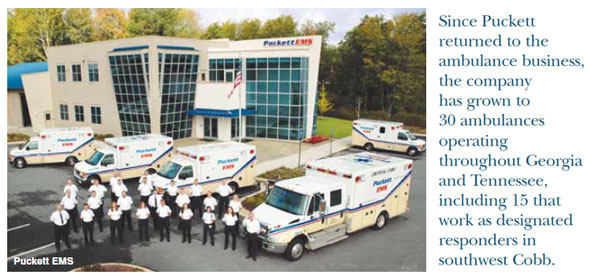
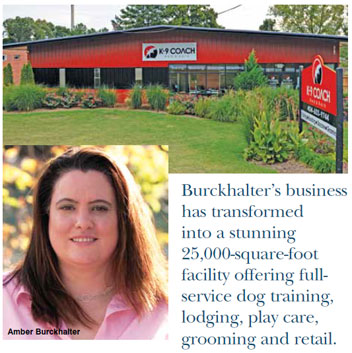 While studying to become an attorney, Amber Burckhalter suffered a health crisis that brought her dream to a sudden end. “I didn’t know what to do with my life, so I went back to what I knew,” says Burckhalter, who founded K-9 Coach 13 years ago. “I had worked at a vet center, and I always loved animals.”
While studying to become an attorney, Amber Burckhalter suffered a health crisis that brought her dream to a sudden end. “I didn’t know what to do with my life, so I went back to what I knew,” says Burckhalter, who founded K-9 Coach 13 years ago. “I had worked at a vet center, and I always loved animals.” After working as an in-house graphic designer for IBM and leading design firms where her clients included Kodak, Macy’s and The New York Times, Kriston Sellier opened her own graphic and web design company in 2001 and “hasn’t looked back since.” In 2004, Sellier moved her at-home design business to Marietta so her husband could be closer to his job at CarMax’s Kennesaw branch.
After working as an in-house graphic designer for IBM and leading design firms where her clients included Kodak, Macy’s and The New York Times, Kriston Sellier opened her own graphic and web design company in 2001 and “hasn’t looked back since.” In 2004, Sellier moved her at-home design business to Marietta so her husband could be closer to his job at CarMax’s Kennesaw branch.
 Advanced Electronics Recycling Solutions and Edens proudly offers this free electronics recycling day. Now you can drop off your unwanted electronics, computers and small appliances, FREE OF CHARGE! For one day only! There will be a nominal fee of $10 to drop off televisions. The event will take place in the parking lot at the main entrance of the Merchants Walk shopping center. Items accepted includes; computers, laptops, cell phones, mp3, dvd, vcr, stereo equipment & more.
Advanced Electronics Recycling Solutions and Edens proudly offers this free electronics recycling day. Now you can drop off your unwanted electronics, computers and small appliances, FREE OF CHARGE! For one day only! There will be a nominal fee of $10 to drop off televisions. The event will take place in the parking lot at the main entrance of the Merchants Walk shopping center. Items accepted includes; computers, laptops, cell phones, mp3, dvd, vcr, stereo equipment & more.

